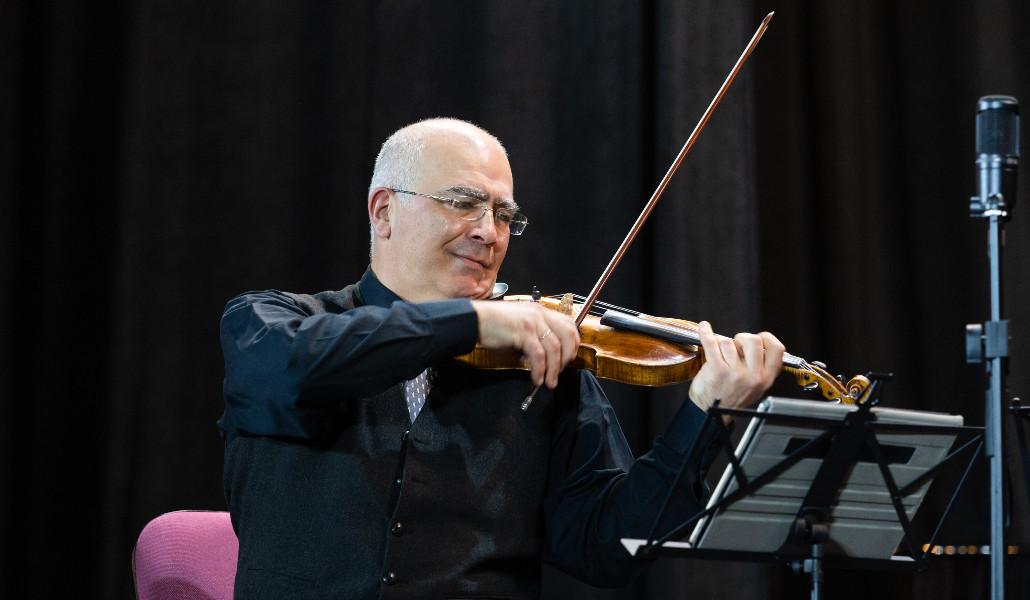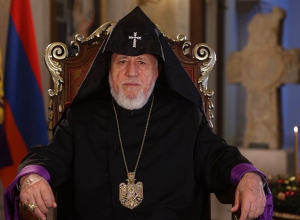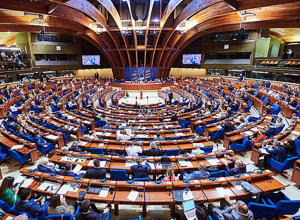
I love creating interesting musical "feasts": Movses Pogossian
Support A1+!The VEM string quartet from the University of California, Los Angeles (UCLA), led by Movses Pogossian, a violinist, UCLA professor, and a leading figure in contemporary classical music, recently performed in the Hall of the Union of Architects of Armenia, featuring soprano Daniel Segen, pianist Artur Avanesov, as well as the bandleader of the State Jazz Orchestra of Armenia, saxophonist Armen Hyusnunts.
Before the concert, "A1+" spoke with Movses Pogossian, the artistic director of the VEM string quartet.
Movses Pogossian was born in Yerevan. He studied at the Komitas Conservatory of Armenia, then he continued his studies at the Tchaikovsky Conservatory of Music in Moscow, after which he moved to the USA.
- Mr. Pogossian, you have chosen a difficult path, that is, you mainly perform pieces by contemporary composers, but the audience, by and large, prefers to listen to more popular, widely known compositions that are, so to speak, easy to understand, and that’s why many musicians opt for using various "tricks" to draw the audience.
- That might be so, but that is my way and my choice. Yes, I decided against taking the easy way, and instead, I strive to teach the listener to enjoy new compositions that are harder to comprehend. As for the musicians who try to draw the audience with various "tricks" and become popular this way, I do not judge them. Let me put it this way: I also like "theatrics", we all need to have fun. And there are prominent virtuosos who have chosen this field. Anyway, everyone is entitled to choose their own path. Chamber music is closer to my heart, and I enjoy discovering and performing new compositions of intellectually stimulating contemporary music. Regarding the audience, you have to prepare, tell, and present in the right way. For example, Tigran Mansuryan's trio will be performed at this concert, which was written fifteen years ago for Kim Kashkashian and me, and which we premiered in Los Angeles. It is not an easily digestible music. It is not "A Piece of Sky" (a Soviet Armenian movie, t/n). I must say that Armenian listeners love Mansuryan's music that is composed for movies, while outside Armenia, Maestro is known and loved for his concertworks. During this concert, before Mansuryan's Trio, two wonderful Armenian chants will be performed: "Horzhamn" and a melodious piece by an eighth-century female musician Khosrovidukht, the arrangement of which was made by Arthur Avanesov - who, by the way, executed it beautifully. These musical introductions should prepare the audience to listen more intently, to understand the musical roots, and to see how centuries-old ties are connected to the present. In a way, I feel like a chef, who prepares very tasty "dishes", which, however, should be enjoyed in the right order.
- A composer’s piece of music should be played for people to listen to and discover classics-to-be, just like an artist’s painting should be exposed to the world. You, too, are guided by this principle, aren’t you?
- Yes, definitely. Let's not forget that Beethoven and Brahms were also criticized for their innovations at the time. Meanwhile, these innovations have become beloved standards.
- And do you think that there might be a PR issue? What becomes, so to speak, trendy is accepted and understood much easier.
- Yes, it is possible. Actually, according to research, if you play contemporary classical music for children daily from a young age, they will enjoy listening to it when they grow up. Take Schoenberg's works for example, which are, to put it mildly, not easy to digest for the general concert-goer. I also noticed another strange phenomenon. People perceive modern art more easily than music. The secret, perhaps, is hidden in the nuances of visual and auditory perception?
- Maybe. And how do you couple the seemingly incompatible saxophone with the string quartet? There is a piece in the program that you are doing with Armen Hyusnunts.
- Yes, it’s Hysnunts’ "Aria and Dance". Armen and I have been friends for fifty years, and this piece, which was written at our request, will be performed in Armenia for the first time. Ten years ago we premiered it in Los Angeles where it was very well received. I like creating unique programs, so to speak, interesting musical "feasts".
- Now let's talk about your activities at the UCLA Herb Alpert School of Music in Los Angeles because this time you are visiting together with the students of the University's Armenian Music Program.
- I have been teaching at UCLA for close to two decades, and I am also the founder and director of the UCLA Armenian Music Program for the last ten years. For several years now, we have been implementing a program at UCLA that aims at spreading Armenian music. Every year, a few students study works by Armenian composers under my guidance. We select the best students: one singer and a string quartet. This is already the seventh lineup. Students of different ethnicities, who previously had no idea about Armenian music, after a while fall in love with the works of Armenian composers. Today, by the way, during the rehearsal, when they were performing Mansuryan's "String Trio", which has a very beautiful ending, I turned to the violinist to clarify something and realized that she did not comprehend what I said. When I got closer, I saw that she was crying. She was moved by the power of music.
- We also had concerts in Dilijan and Gyumri. By the way, we performed in Gyumri in the hall of the first university of Armenia, where Richter, Oistrakh, Rostropovich, and Gilels also loved performing - It was Mansuryan who told me about that. The hall had fantastic acoustics. And the highlight of our trip was being hosted at Maestro's house. He worked with the students, and together they discussed the interpretative nuances of his String Trio.. Can you imagine what a gift that was for the young musicians?
- Now we have expanded the activities of the university even more. I have a wonderful new colleague, Melissa Bilal, an Armenian from Istanbul, and an ethnomusicologist by profession. Now we manage the Armenian Music Program Together. We have already established an ensemble of Armenian folk instruments, as well as dance and music history courses. In addition, the courses are divided into beginner and advanced courses. I must say that outside of Armenia, there is no other university with such a program where Armenian musical art is studied.
- And which instruments do students prefer?
- Duduk, then Shvi. I also want to mention that we commission works from Armenian composers and we record their works for CDs. And that is an important mission, to find gifted composers and help their compositions to be performed.
- With which composers have you collaborated?
- Michel Petrossian, who lives now in France, Ashot Zohrabyan, Artur Avanesov, wonderful composers Artashes and Ashot Kartalyan (father and son living in Los Angeles), young composer Aregnaz Martirosyan. Soon we will also record works by: Khosrovidukht, Romanos Melikyan, Tigran Mansuryan, Artur Avanesov, Vache Sharafyan, and Artur Akshelyan.
- In addition to the fact that you prefer to perform contemporary music, you were also the artistic director of the "Dilijan" chamber music concert series in Los Angeles for many years, which also aimed at spreading new Armenian music and supporting modern Armenian composers. Will "Dilijan" continue the concert series or have you closed that page?
- When we moved with my family to Los Angeles, I met the formidable musician Vatsche Barsoumian, who is a founder and director of the Lark Music Society in Glendale. He suggested creating a chamber music concert series. That was in 2004. A year later, our first concert series took place and went on for 15 memorable years. "Dilijan" was founded with the goal to demonstrate the works of Armenian composers, especially contemporary composers to the world; to perform the best Armenian and international composers. We had to pause for a while because of the pandemic. We will resume soon, but from now on each concert series will have its own artistic director, who will invite musicians and compile a program. And I will be occasionally featured as a guest artist!



